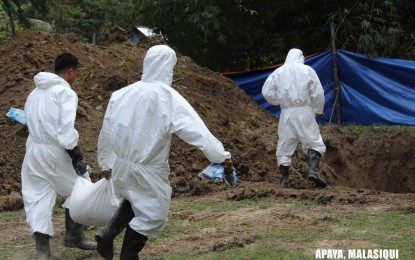
PROTOCOL VS. ASF. Culling operation continues in Barangay Apaya, Malasiqui, Pangasinan on Wednesday (Jan. 22, 2020) as part of the implementation of the Department of Agriculture's "1-7-10” protocol to manage and contain the African swine fever. Some 227 hogs were culled in Barangay Apaya Malasiqui and 106 hogs in Barangay San Isidro Binmaley as of Tuesday. (Photo courtesy of Province of Pangasinan Official Facebook page)
MALASIQUI, Pangasinan -- Some 333 hogs were culled in Barangay San Isidro Sur in Binmaley town and Barangay Apaya here as of Tuesday, as part of the enforcement of the Department of Agriculture’s “1-7-10” protocol to manage and contain the African swine fever (ASF) that hit both towns.
“The ASF Task Force in Pangasinan has started culling operations yesterday (Jan. 21) in Barangay San Isidro Sur, Binmaley with 106 hog culled and in Barangay Apaya in Malasiqui with 227 hogs,” the provincial government of Pangasinan said Wednesday in a post in its Facebook page.
The Task Force, led by the Office of the Provincial Veterinarian (OPVET), continued the culling operations on Wednesday in San Isidro Sur and Apaya.
“The culling operations will extend up to Barangay Polong in Malasiqui Wednesday if the culling of pigs in Barangay Apaya will be completed early,” Assistant Provincial Veterinarian Jovito Tabarejos said in an interview Wednesday.
Tabarejos said the first ASF case in the province this year was recorded in Barangay Linoc, Binmaley and later last week, some hogs were also found positive in Barangay Apaya in Malasiqui town.
Authorities are tightly monitoring other areas while awaiting laboratory results from the blood samples extracted from the other hogs within the seven-kilometer radius from the affected barangays.
Under the 1-7-10 protocol, swine would be under surveillance with restricted movements within the seven-kilometer radius, and blood testing would be undertaken.
In a one-kilometer radius from the site of infection or ground zero, hogs will be prohibited from entering and going out of the area, and eventually be depopulated.
For the 10-kilometer radius from ground zero, mandatory monitoring and reporting of swine disease occurrences shall be implemented.
In an emergency meeting on Sunday, Governor Amado Espino III ordered Task Force ASF to intensify measures to stop the spread of the virus hence, quarantine checkpoints have been set up in the entry and exit points in the said towns.
He also directed a thorough investigation and if warranted, the filing of appropriate cases against unscrupulous individuals who directly or indirectly contributed to the new round of ASF infection in the province just to gain undue profit.
He also approved the recommendation on the formulation of a reward system to encourage the active involvement of the citizenry in the intensified crackdown.
“I am confident that this new case of ASF can be contained just like before, noting the usual unity, cooperation, and commitment among local government units, the national government agencies especially the DA and the Philippine National Police, and the provincial government executives and employees,” Espino said.
Last year, Mapandan and Bayambang towns were affected by ASF but the virus was contained. (PNA)
